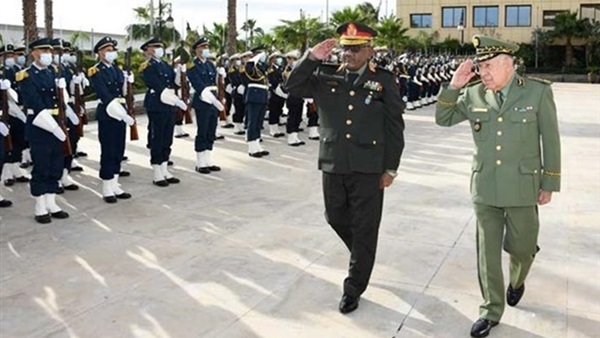Sudan army chief of staff pays 'unique' visit to Algiers

Chief of Staff of the Sudanese army,
Mohamed Osman al-Hussein, arrived in Algiers on November 22 for an official
visit, described by some people as 'unique'.
Accompanying the Sudanese army
official was a high-level delegation from his country.
During the visit, al-Hussein met his
Algerian counterpart, Said Chengriha.
Compatibility
The visit of the Sudanese official
to Algeria coincides with an announcement by Chairman of the Sudanese Sovereign
Council, Lt. Gen. Abdel Fattah al-Burhan, on November 13 that the Sudanese army
wants consensus and a civilian government to guard it, away from partisan
quotas.
The same visit comes within the
context of progress in relations between Khartoum and Algiers, including in the
political, economic and security fields.
This progress, some people believe,
reflects Algeria's desire to support Sudan again after its economic and
financial situation has improved.
Algerian official delegations paid
visits to Sudan in recent months to discuss co-operation and investment
opportunities, especially in the exploration of oil, gas and minerals.
Transition
protests
After the resignation of late
Algerian president, Abdelaziz Bouteflika, on April 2, 2019, following popular
protests and pressure from the army's leadership, the late chief of staff of
the Algerian army, Ahmed Gaid Salah, refused to seize power or share it with
civilians.
He rather preferred to respect his
country's constitution.
On the basis of the constitution,
pre-presidential elections were organized, after a difficult transition that
lasted only a few months.
The elections succeeded, however, in
steering Algeria towards safe shores.
There are considerable similarities
between Sudan and Algeria, especially with regard to the army stepping in to
force former president Omar Hassan al-Bashir to step down.
This took place only nine days after
the late Algerian president left the office of president under pressure from
the members of the public.
Nevertheless, there are differences
between the two countries, especially when it comes to the results.
Sudan has not got out of its
transition yet. This transition should have come to an end on November 21 with
the holding of elections. The transitional period in this country was extended
for 14 months additional months.
Way out
The Sudanese army looks for a way
out of the political crisis, in which the country flounders. The same crisis
makes the prospect of national division and army disintegration very possible.
The security challenges facing the
Sudanese army have become very complex, both at the internal and the external
levels.
The political crisis of the country
also becomes more intense with the passage of time, especially in the eastern
part of Sudan.
This comes in the wake of a threat
by the Beja Tribal Council not to recognize the central government in Khartoum
and form a local government to secede from Sudan.
The Darfur region in the west of the
country experiences fragile stability. It is not unlikely that peace will
collapse in it, if the political crisis in Khartoum is not resolved.
This difficult security situation
may tempt terrorist groups in the Sahel region, especially the Greater Sahara
ISIS and Boko Haram, to march from Lake Chad to the Darfur region.
Ethiopia's Blue Nile dam crisis also
puts pressure on Sudan, along with the political and security split in Libya.
This tough situation pushes the
Sudanese army to look for a strong ally to support it in the face of all these
simultaneous challenges.
The Sudanese and Algerian armies
face several common challenges, on top of which is the political and security
crisis in Libya, which necessitates their coordination.
Relations between the two armies
deteriorated in 2016, against the background of reports that the Sudanese army
played a role in supporting one of the parties to the conflict in Libya.





